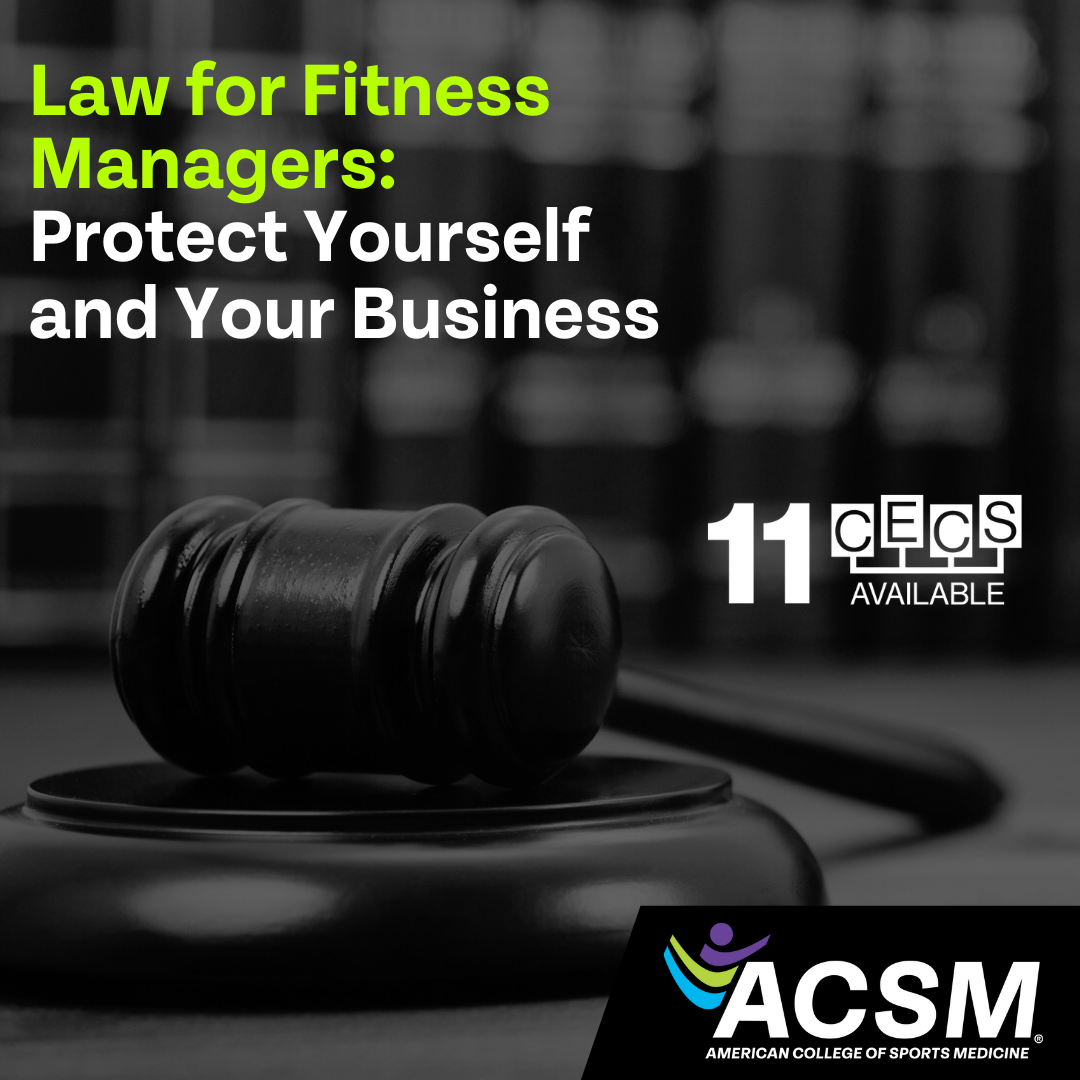ACSM |
Aug.
27, 2024
 It’s an unfortunate fact that working in the fitness industry can put you at legal risk. Whether you own a facility, manage one or merely work with clients, you could find yourself in the crosshairs of a lawsuit — or worse.
It’s an unfortunate fact that working in the fitness industry can put you at legal risk. Whether you own a facility, manage one or merely work with clients, you could find yourself in the crosshairs of a lawsuit — or worse.
Respondeat superior
For instance, did you know that facility managers can be held liable for the actions of their employees under the principle of respondeat superior? (The literal translation from Latin is “the superior must answer.”) You don’t even have to have been there when an unfortunate incident occurred; if someone working under your supervision made a bad call, you might be legally liable. This is just one of many potential risks fitness pros are often unaware of.
Fortunately, ACSM — in partnership with JoAnn Eickhoff-Shemek, Ph.D., FACSM — has put together a comprehensive course to help you mitigate your risk. Taking you step by step through actual legal cases, Law for Fitness Managers and Exercise Professionals will arm you with the tools you need to protect yourself, your business, your employees and coworkers, and your clients.
“One of the best ways to learn how to comply with the law is to review real cases that occurred in fitness facilities and programs,” says Eickhoff-Shemek. “It’s time to protect yourself and your business from costly negligence lawsuits — some of these in recent years have been in the millions of dollars.”
The 11-CEC course contains five modules spanning risk management, negligence, HR and personnel issues, equipment and facility considerations, and emergency planning and response. Learn what laws you need to know, why you need to know them and how to apply this knowledge in practice.
“This course focuses on providing legal/risk-management content that is often not adequately covered in academic and certification preparation programs,” Eickhoff-Shemek adds.
Reasonable safety
Another important issue the course covers? “Reasonable safety.” Fitness managers and exercise professionals are expected to provide reasonably safe programs and facilities, meaning you need to be certain you’ve both set up risk-management strategies and created an environment that together limit the likelihood of foreseeable accidents occurring.
Fitness equipment
In most facilities, part of that environment includes fitness equipment. And fitness equipment brings with it four categories of legal liability: “negligence of exercise professionals,” “negligence of fitness managers/owners,” “negligence of participants” and “fault of manufacturers.” Depending on the issue a client or visitor encounters, you might be liable.
In conclusion
These are just a few examples from this thorough course. Consider taking Law for Fitness Managers and Exercise Professionals — it could not only save you from future headaches but more importantly help you provide a safer space for your employees, coworkers and clients.
Take the course:
Disclaimer: This article is written for general informational purposes and is not intended as legal advice.
About the course designer:

JoAnn M. Eickhoff-Shemek, Ph.D., FACSM, FAWHP, professor emeritus of exercise science at the University of South Florida and president of the Fitness Law Academy, LLC, is an internationally known author and speaker. For more than 35 years, her teaching and research have focused on fitness safety, legal liability and risk management issues. Dr. Eickhoff-Shemek is the lead author of a textbook, Law for Fitness Managers and Exercise Professionals, and co-author of another textbook, Rule the Rules of Workplace Wellness Program, published in 2020 and 2021, respectively. She currently serves as the fitness safety columnist for ACSM’s Health & Fitness Journal.